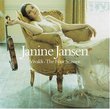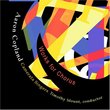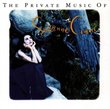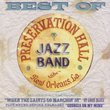| All Artists: G. Gershwin, Lawrence Winters, Camilla Williams Title: Masterworks Heritage Edition - Gershwin: Porgy & Bess Members Wishing: 0 Total Copies: 0 Label: Sony Original Release Date: 1/1/1951 Re-Release Date: 6/16/1998 Album Type: Original recording remastered Genres: Jazz, Pop, Soundtracks, Classical, Broadway & Vocalists Styles: Oldies, Vocal Pop, Opera & Classical Vocal, Historical Periods, Modern, 20th, & 21st Century, Musicals, Traditional Vocal Pop Number of Discs: 2 SwapaCD Credits: 2 UPC: 074646332221 |
Search - G. Gershwin, Lawrence Winters, Camilla Williams :: Masterworks Heritage Edition - Gershwin: Porgy & Bess
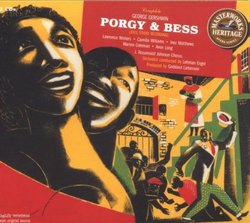 | G. Gershwin, Lawrence Winters, Camilla Williams Masterworks Heritage Edition - Gershwin: Porgy & Bess Genres: Jazz, Pop, Soundtracks, Classical, Broadway & Vocalists
Columbia's 1951 Porgy and Bess set new standards for recorded opera during the LP era's teething stage. Choral, solo, and orchestral forces emerge with three-dimensional clarity that brings you closer to the characters and... more » |
Larger Image |
CD DetailsSynopsis
Amazon.com Columbia's 1951 Porgy and Bess set new standards for recorded opera during the LP era's teething stage. Choral, solo, and orchestral forces emerge with three-dimensional clarity that brings you closer to the characters and the story. Sound effects also help, but the rattling dice overstay their welcome. The superb cast not only sings with warmth and flair, but also relishes their words to the point that you need not follow the libretto. Lehman Engel moves things along nicely, but sometimes whips up tempos at climaxes, Broadway style. The word "complete" graces the CD jacket, so you won't learn about the cuts unless you listen with score or read the booklet notes. --Jed Distler Similarly Requested CDs
|
CD ReviewsGLORIOUS MOVIE MAVEN | New York, NY USA | 07/24/2002 (5 out of 5 stars) "Every one of the Masterworks Heritage CD's I've bought are more than just worthwhile. First, the artwork in the enclosed booklets is from the original releases; then, of course, the historical magic of these recordings works like a charm. PORGY AND BESS, arguably the finest American opera ever written and certainly one of the Twentieth Century's most melodic and moving pieces of musical theatre is given a rich treatment in this set of two Sony CD's. Some fans call it a musical comedy and others insist it is a true opera. No matter. With a first-rate cast PORGY AND BESS works well in venues as different as Radio City Music Hall is from the Metropolitan Opera House. I have seen and loved it in both of these places.The cast of this 1951 studio recording could hardly be bettered: Lawrence Winters and Camilla Williams are wonderful in the title roles and Avon Long practically owns the major supporting role of 'Sportin' Life.' Lehman Engel is for now and always one of the greatest Broadway conductors and the J. Rosamond Johnson Chorus works hard to great effect, singing and acting all of the characters who live in Catfish Row. There are numerous photographs and original designs within the liner notes and even the CD's, themselves, are cleverly made to duplicate the look of the original LP's.If you've really never heard all of PORGY AND BESS this is a good recording to start with. There are more modern recordings with much better sound (I particularly like the one from Glyndebourne, England on EMI) and this set is obviously abridged, but it has most of the great music from the 'hit tunes' like "Summertime" and "I Got Plenty Of Nuttin'" to the lesser known "Oh, I Can't Sit Down!" and "Ha-da-da, ha-da-da." The score and lyrics by George and Ira Gershwin and Du Bose Hayward work perfectly to make one of the true glories of modern musical theatre. HIGHLY RECOMMENDED." This is an excellent recording,but.... albertatamazon | East Point, Georgia USA | 06/26/1999 (4 out of 5 stars) ".....there ARE other recordings of the work that are just as good. The only recording which truly comes across as stiff is the 1976 Lorin Maazel-conducted version ---the man simply doesn't seem to understand jazzy rhythms (he positively murders "A Woman Is A Sometime Thing") and Willard White uses his voice considerably better in the Simon Rattle Glyndebourne recording and video. On this 1951 mono recording conducted by Lehman Engel, Lawrence Winters is an excellent Porgy, especially good when you consider that he is using only his voice for characterization,and not his facial expression as well,as Willard White does in the video. There are three excellent recordings of "Porgy" which give you a true sense of being "onstage" and not just at a recording session--the Houston Opera version,the Glyndebourne version,and this one,which,remarkably,actually IS only a studio production,and not a recording of a staged production. The singers sound remarkably close to the microphone,but much of the orchestral detail so easily heard in the stereo recordings is lost here--in fact,the orchestra sounds almost off-mike while the singing is actually going on. Several performances here do sound more "realistic",because some deliberately untrained voices have been used to lend more atmosphere. One that works especially well is J.Rosamond Johnson as Frazier (from the original Broadway cast) who,by this time had almost totally lost his singing voice and instead uses much of his acting ability to recreate much of his performance. There is one big drawback to this production and that is that this is the standard performing version used in 1951, with approximately 45 minutes of the opera cut. Some sensitive listeners might notice that because this recording was made in less politically correct times, the Southern African-American dialect is much more exaggerated, and the use of words like "boss" when the inhabitants of Catfish Row address a white person tends to stand out more. At times,the characterizations in this version tend to sound much more like something out of "Gone With The Wind" than in later recordings; in fact, J.Rosamond Johnson's Frazier comes perilously close to sounding like he's doing the old radio program "Amos n' Andy". Otherwise,though,this is a highly enjoyable version." Look no further. This is THE recording. murnau@earthlink.net | Los Angeles, USA | 05/02/1999 (5 out of 5 stars) "Thank you, Sony, for remastering and re-releasing this towering, exciting, unbeatable recording of America's greatest opera (or is it a musical?).The singing cast is excellent and the orchestra, under the great Lehman Engel's direction, catches every ounce of musical genius and theatrical excitement in the Gershwins' immortal score.Avoid those stiff overblown operatic recordings, along with all those jazz and pop "adaptations" of bits of the score. This is the real thing. In addition, the packaging and notes are beautiful, made to look like the original 1950s double album in miniature.If you don't love this, feel free to send me an abusive e-mail. But if you love Gershwin done right, you'll love this."
|

 Track Listings (24) - Disc #1
Track Listings (24) - Disc #1
